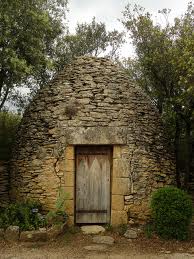In Chapter 20 of the novel, Gabriela describes the following: “the forest abruptly ended at a small expanse of pasture. A cone-shaped stone hut emerged incongruously from its center, the rickety, slab door hanging crookedly from decaying hinges.”
She is referring to a borie–a dry-stone hut structure familiar to the landscape of the Alpes Maritimes and Provence. These were used as shelters for farmers or sheep herders to get away from inclement weather, or to stay out of the elements at night; and some, even today, are used for that purpose.
When living in France, I also saw one of these as I hiked with my sons’ Maternelle class. In another family outing, we went to see an entire village of these huts in the region of the Vaucluse. Even got stuck in a freak storm there. What is interesting about these huts is not only their age, but also that they use no cement–and they are leak proof. Who said that ancient man was not canny. I don’t think we can do something similar today 🙂
I am attaching a picture of the borie so that you can appreciate what Gabriela saw (it also looks like a hard-boiled egg, cut in half, and placed in the middle of nowhere).







